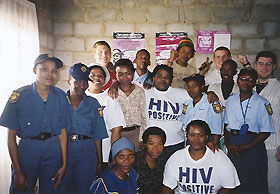For more archives, go to the Advance Archive/Search Page.
Biology Major Travels To South Africa
To Help Out At HIV/AIDS Clinic
Adam Mastrocola listened intently. It was the 21-year-old's first day working as a volunteer in a low-income rural area of South Africa. The taxi ride to meet his guide was so rough-and-tumbl e that he felt queasy. The guide had led the way through a maze of dirt roads, past numerous small shacks, and had then disappeared inside one, leaving Mastrocola to wait outside.
 |
Adam Mastrocola, back left, with clients and workers at an HIV/AIDS clinic just outside East London, South Africa. At back right are some Canadian students who also visited the clinic.
|
There was an exchange in the Xhosa language, followed by laughter.
Soon, the guide invited him in, and explained: the woman who lived there was laughing because she couldn't believe that a white American student had traveled thousands of miles to understand her plight.
Mastrocola, a molecular and cell biology major, spent his summer volunteering at an HIV clinic in South Africa. "I've always been interested in infectious diseases," he says. "And I wanted to use the summer to explore a third world country."
So he joined an on-campus program known as Student Ambassadors for Human Rights. With funding from the Undergraduate Research Office and a contact from Noxolo Mafu, a South African graduate student who works with the Student Ambassadors, Mastrocola went to work at the Ikhwezi Lokusa Wellness Center, an HIV/AIDS clinic in the South African city of East London.
The first thing that struck Mastrocola about the clinic was the intense level of commitment among the workers. The small staff handled 60 to 65 patients a day.
But what really made an impact, he said, was seeing firsthand how promoting HIV prevention and awareness is not simply a matter of having the appropriate antiretroviral medicine in South Africa. The day-to-day socio-economic realities of survival present major obstacles.
"It costs a fair amount simply to travel to the clinics, sometimes from very far distances," Mastrocola says, and patients are often too sick to take buses.
"If you can either get medication and supplements for yourself, or feed your children so they don't die of starvation, you feed your children," he said. "My experience provided a different spin on the approaches I had read about regarding tackling HIV."
Mastrocola spent his days either traveling to local townships with medicine and information, or working in the clinic. He helped develop funding ideas for a local clinic, and participated in the construction of a small clinic. He made presentations to student groups in an attempt to break myths about HIV. And he helped give physicals, check patients, and take case histories.
Mastrocola says his summer in South Africa had a profound effect on him. He says he realized that Americans traveling overseas have an enormous responsibility: "When we, as white people from America, enter a village, it raises their hopes. It makes them believe that America is paying attention. But all I could do was listen. I felt helpless."
He's committed to trying to help, however, in whatever way he can. "It's both my duty and my desire," he says.
While in South Africa, Mastrocola also did an internship with the United Nations Development Programme's (UNDP) regional unit on AIDS in Africa. He plans to return to South Africa next year for an extended internship with the head of the unit.

